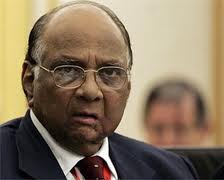
New Delhi, July 21: NCP chief Sharad Pawar is threatening to downgrade his relationship with the Congress by quitting the government and extending support from the outside. Sources in the government however say that friction between the allies in Mumbai could well be the reason behind the tension in Delhi.
While Mr Pawar and Praful Patel were making their anger known in New Delhi, Maharashtra's Deputy Chief Minister, Ajit Pawar of the NCP, made an open attack on Chief Minister Prithviraj Chavan, a Congressman. He said the Urban Development Department, which is under the CM, had under-utilised funds allocated to it. "Urban development department is primarily responsible for not spending the fund allocated to them," Pawar, who holds the finance portfolio, told the Legislative Council while replying to a question on alleged inadequate expenditure of plan funds by various departments.
While nephew Ajit attacked a department in his own government for under-performance, NCP chief Sharad Pawar is also said to be unhappy with Mr Chavan's decision-making. Sources say there is a feeling that the NCP's ministers are being targeted in Maharashtra.
Part of this standoff seems to be fuelled by Chief Minister Prithviraj Chavan declaration that his govt will present a 'white paper' on what the state had spent on irrigation in the last 10 years and the benefits. This comes amidst Opposition allegations that Maharashtra has spent over 70,000 crores in that period but added only 0.1% to the area under irrigation.
A 'white paper' is an authoritative report - usually brought out by a government or its agencies - that help educate people about a problem and aid decision making and legislation
While the state's Water Resources Minister, NCP's Sunil Tatkare told the state assembly on Wednesday that a white paper on irrigation would be tabled before the legislature in the winter session, he is opposed to the 10 year period. The NCP wants to table a 'white paper' providing the details for the last three years.
Interestingly, between 1999 and 2009, Ajit Pawar was the minister in charge of irrigation - under three successive Congress Chief Ministers. Mr Tatkare's demand for a 'white paper' that covers his three years in charge of the department exempts Ajit Pawar's tenure as minister.
The NCP's top leaders are expected to meet on Monday to decide its next step.
Both parties say they have the weekend to resolve their differences. It is imperative that they do - in Maharashtra, the Congress and NCP are looking for a fourth term in power. The state votes for its next government in 2014. Estranged cousins Raj and Uddhav Thackeray have begun taking steps towards a possible reconciliation. If their parties, the Shiv Sena and the MNS combine with the BJP, the incumbent coalition could have a real fight on its hands.




Comments
Add new comment